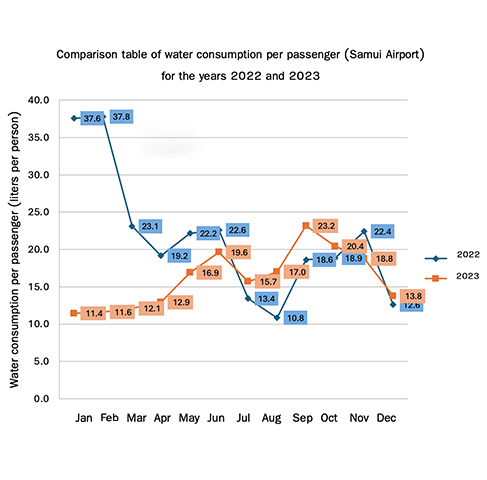The Environment
With an eye on top environmental issues, Bangkok Airways takes climate crisis management very seriously. The Company has been implementing the efficiency jet-fuel management projects to reduce CO2 emissions. Additionally, the airline has joined the Carbon Offsetting and Reduction Scheme for International Aviation (CORSIA) by ICAO to support the objective of lowering CO₂ emissions for international flights. Furthermore, the Company has also been studying the use of Sustainable Aviation Fuel (SAF), which will significantly reduce carbon dioxide emissions in the aviation industry. The aim is to curb aviation’s impact on climate change and achieve Net Zero Carbon Emissions by 2050.
Assessment of the Organization’s Carbon Footprint
The assessment of organization’s carbon footprint (Scope 1 and 2) in 2023 was conducted in 5 areas:
- Central areas consisting of the Head Office Building, Operation Center (Suvarnabhumi Airport), work areas at Suvarnabhumi Airport and Domestic Cargo Warehouse.
- Hangar, Don Muang Airport
- Samui Airport
- Sukhothai Airport
- Trat Airport
The data was verified by ECEE Company Limited. The results of the assessment, certified by the Thailand Greenhouse Gas Management Organization (TGO) can be summarized as follows:
| Scope 1 | Scope 2 | Scope 3 |
|---|---|---|
| 288,794 Ton CO2 | 4,428 Ton CO2 | 959 Ton CO2 |
The Company is conducting a study and preparing data for the assessment of its carbon footprint (Scope 3), including expanding the areas for assessment to be more comprehensive, starting in 2024.
Benefits from Waste Separation
In 2023, greenhouse gas emissions were reduced by 317.148 kgCO2e through waste separation at the head office building.
Installation of waste separation bins and drop boxes in the boutique lounge at Suvarnabhumi Airport.
To further the "Beneficial Waste Separation" project, the company has installed waste separation bins within the passenger lounge (Boutique Lounge) at Suvarnabhumi Airport, starting in September 2023, aiming to encourage passengers to participate in environmental conservation by separating waste at its source.
In 2024, the company plans to expand this initiative by installing waste separation bins in passenger lounges at additional stations including Trat, Sukhothai, Chiang Mai, and Phuket. This expansion aims to increase the volume of recyclable materials, thereby reducing the company’s waste destined for landfills in the future.
Regarding the "Drop Box" bins, these are specifically for collecting PET plastic bottles and other plastic bottles without labels from passengers within the Boutique Lounge. The company collects these bottles and forwards them to Circular Industry Company Limited for processing into plastic fiber, adding value to plastic waste and maximizing the recycling of resources for optimal benefits.

Up-cycling old uniforms
One initiative developed by the Company is to manage resources efficiently by campaigning employees to send old or un-used uniforms to be up-cycled by processing into new product without any waste according to Circular Economy concept. The up-cycled product can be used in business process such as making new aprons (limited edition) used by employees working in passenger lounge. Under Love Earth, Save Earth campaign, this project reinforced the policy in management of climate change and efficient management of waste.
Together with Circular Industry Company, the Company sent old uniforms weighing 300 kilograms, to make new fabric without going through dying process, avoiding any impact on the environment and reducing fine dust (PM 2.5) caused by destruction of uniforms by old method, changed to creating new products with added value by innovative production process that does not harm to the planet.
By up-cycling 300 kilograms of uniforms, the Company was able to reduce emission of carbon dioxide by 1,771.44 kilograms, reduced amount of water usage by 58,348.62 litre, and saved electricity by 10,523.37 kilowatt per hour.

Environmental Management of Airports
The Airport Department has formulated an Environment Policy for the three airports - Samui Airport, Sukhothai Airport, and Trat Airport - effective on 1 April 2021 to ensure that environmental management and operations at the three airports follow the same format and direction.
Framework of Environment Policy
- Management of airport business according to environmental standard and requirements, rules and regulations of Ministry of Natural Resources and Environment and Civil Aviation Authority of Thailand and other related laws in compliance with Thai standard and international standard.
- Supervise, control and comply with protective and corrective measures on effect to the environment and measures to monitor and check effect to the environment according to requirements of related Thai agencies and international agencies.
- Campaign, promote, create awareness and participate in management of natural resources and the environment to meet objectives and target with a view to reduce effect to the environment, for example promote use of environmentally friendly resources, separation of waste at the source, minimize use of energy and reduce emission of greenhouse gas.
- Publicize environmental policy, monitor performance, make improvement in consistent with current operation and review the policy continuously.
- Set target, prepare plans, follow up and assess performance on the environment to comply with requirements of law and related requirements.
Additionally, the Airport Department has also appointed environmental working groups at each of the three airports, responsible for supervision and control of environment-related work to enhance efficiency of performance.
Efficient Resource Management (Water Management)
Aspiration
Manage water efficiently to meet the needs and readiness for service provision and convenience derived from airport operations, including improving water usage efficiency within production processes to ensure quality.
Strategy
- Implement comprehensive water management to mitigate risks effectively.
- Enhance water use efficiency in production processes.
- Treat wastewater to meet environmental impact assessment (EIA) standards.
- Utilize treated wastewater effectively, such as for irrigation of green areas within the airport premises, without discharging wastewater outside the project boundaries as per EIA requirements.
- Develop and promote the capabilities of personnel involved in water management.
- Monitor, inspect, and rehabilitate water sources to enhance water storage capacity, capable of capturing surface water and rainwater to serve as sustainable water sources for potable water production, adequately meeting the airport's service requirements.
The Guidelines for Efficient Long-Term Water Management.
- Improve the efficiency and suitability of the water supply system to adequately serve passengers and accommodate the expansion of tourism and increased flight traffic.
- Ensure treated wastewater meets environmental impact assessment (EIA) standards and reuse it for watering airport landscaping away from passenger areas. Also, upgrade watering systems to underground piping to reduce health impacts on users and airport staff.
- Responsible divisions should plan actions to reduce water loss, including installing meters in buildings to monitor monthly water usage trends. Significant increases in usage should prompt inspections to detect and fix leaks.
- Implement Preventive Maintenance (PM) plans, including daily inspections of restroom facilities for leaks. Any leaks found should be promptly reported and repaired (Corrective Maintenance).
- Monitor monthly potable water usage in passenger and office facilities. Address abnormal water use promptly.
- Reuse all treated wastewater for airport landscaping to maximize water usage efficiency.
- Conduct water conservation campaigns, record water usage statistics for comparison with demand, and adjust relevant plans and measures accordingly.
Performance Results
Comparison table of water consumption per passenger for the years 2022 and 2023 (Samui Airport)

Projects to study use of alternative energy
The Airport department is gradually changing the source of energy for airside vehicles and aircraft tools from gasoline to electricity, maintaining a focus on usage with maximum safety.
Initially, an EV Charging Station is being installed to serve the local community, rental car groups, and tourists who use electric vehicles. The first installation is being considered for Samui Airport.

EV Charging Station at Samui Airport